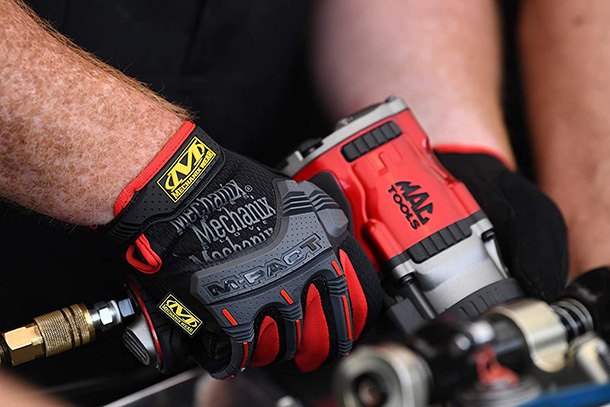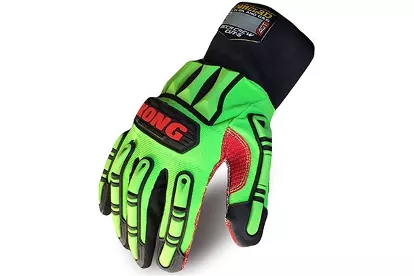Top 5 Best Mechanic’s Gloves

Quick – what’s the first thing you reach for when starting any DIY project? No, it isn’t the perpetually absent 10mm socket, nor is it a quarter for the swear jar. It is, most likely a good pair of gloves.
Protecting your hands serve many purposes, from keeping them off harsh chemicals to cushioning a blow when you finally overtorque a stubborn bolt and your knuckles make contact with that infernal exhaust flange.
We’ve assembled five good options, led by the pair that your author dons each time he picks up a wrench.
1. Ironclad KONG Deck Crew 5

We’ll start this list with a product on which I spent my own money. These exact gloves from Ironclad have protected my hands while wailing on the stuck starter bolt of a 2010 Ram 1500, insulated them while installing the umpteenth shear pin on a 420cc Ariens snowblower, and kept them dry while wheeling a 181hp Polaris through the mud.
The palms of these gloves are treated with Teflon for oil and water resistance in addition to having a grippy surface. Ironclad claims an 80 percent impact absorption on the fingers and 90 percent on the knuckles. All I can tell you is that my hand did not hurt when the wrench slipped off that blasted starter bolt for the second time. At three years of age, they show no sign of wearing out any time soon.
Pros
- Excellent fit, stellar reviews, great quality
Cons
- Expensive
Bottom Line
- Worth the cash
2. Mechanix Wear – Original Work Gloves

No list of mechanic’s gloves would be complete without at least one entrant from the company who arguably created (or at least popularized) the notion of buying a particular type of glove specifically for use while working on cars.
Like KFC, these gloves are the brand’s original recipe, offered in nine sizes and six colors. They contain synthetic leather and their thermal plastic rubber hook and loop cuffs make them easy to take on and off. As anyone who’s donned a pair of these things will tell you, their smooth-surface thumb and index finger make for pretty good dexterity.
Pros
- Wide variety, the OG mechanic glove
Cons
- You’re not exactly standing out in a crowd
Bottom Line
- Popular for a reason
3. Ozero Tactical Gloves with Touch Screen Fingertips

Have you spent too much time playing Call of Duty? Do you harbor fantasies of sneaking stealthily through the garage with no one noticing your hands? These mitts are advertised as ‘tactical gloves’ which at least make for an interesting talking point when you’re on break.
Constructed of flexible microfiber and lightweight polyester, these form-fitting utility gloves should retain your manual dexterity and permit the wearer to pick up small tools or items. These gloves have a touchscreen feature at its thumb and index finger to allow convenience while consulting your phone for further YouTube instruction in fixing the new problem you created while trying to fix your car.
Pros
- Phone friendly, form fitting
Cons
- Less impact protection than other gloves
Bottom Line
- Watch yer fingers
4. Mechanix Wear – M-Pact Work Gloves

If the off-brand listed above is attempting to mimic anything, it’s definitely these M-Pact gloves from Mechanix. Its thermoplastic rubber (TPR) compound provides a knuckle guard and full-length fingertip protection to reduce the risk of impact and pinching injuries.
A dual-layer internal fingertip reinforces the index finger and thumb for added durability since these are the most common places for a glove to wear through. Palm padding absorbs and dissipates high-impact energy, so go ahead and haul out that ancient-but-trusty impact wrench.
Pros
- OG brand, years of R&D
Cons
- More costly than some others
Bottom Line
- You get what you pay for
5. Vgo Heavy-Duty Synthetic Leather Mechanic Gloves

Residing squarely in the random letter brand name end of the pool is this pair of gloves that includes built-up PVC patches on the back. A four-layer structure sounds like a good cake but is actually how this company describes that area of these gloves in a bid to promote their impact protection.
Along with the touchscreen capability, these gloves are said to have a soft terry cloth portion for strong sweat absorption. This goes unmentioned by most other glove makers but is important for those of us who perspire profusely while toiling on a car.
Pros
- Interesting selling features
Cons
- PVC may not be as flexible as TPR
Bottom Line
- Use yer phone and wipe your brow
FAQs
What are the best gloves for car mechanics?
Although the definition of ‘the best gloves’ varies according to the mechanics’ individual preference and usage, all those hard workers agree upon three basic requirements that their gloves should fulfill, namely:
High Dexterity
With gloves that provide high dexterity, the mechanics can work more comfortably, especially when reaching out at narrow spaces of the vehicles such as under the engine block, etc.
Chemical Resistance
A vehicle’s parts may contain several chemical fluids and substances that can prove to be harmful when the skin is exposed to them. The condition may even worsen if the affected hands accidentally come in contact with other sensitive areas of the body, such as the eyes, mouth, etc. With a pair of chemical-resistant gloves, the skin remains protected, thus allowing the mechanics to work in a safe environment.
Puncture Resistance
The mechanics’ hands may get stuck to some sharp edges that the machinery of a vehicle has and get injured. Therefore, a pair of puncture-resistant gloves with good tolerance is required that can protect the workers from any such accidents.
Since now you know what attributes a pair of gloves must possess in order to be considered ‘the best’, it is time to see how many types of gloves are available, and which among those is safer.
Usually, two kinds of gloves are available for car mechanics. They are:
Disposable Latex Gloves
These types of gloves are made of canvas fabric that further has a latex coating. Because of this, although these gloves offer a high level of dexterity, they do not provide optimum protection from harmful chemicals. In addition, latex gloves are prone to punctures which makes them less durable. That is why they are required to be replaced with a new pair quite frequently. In other words, the only thing that disposable latex gloves are good at is providing decent dexterity.
Nitrile Rubber Gloves
These gloves are made of rubber/vinyl and offer somewhat a reduced level of dexterity as compared to what you get from the disposable latex ones. However, because of the material, they are way securer as they still have good elasticity, and are chemical-resistant and puncture-resistant at the same time. These properties make nitrile rubber gloves comparatively more protective and durable.
To answer your question, most car mechanics nowadays prefer to use nitrile rubber gloves because of the durability and enhanced protection that they offer.
What type of gloves do car mechanics use?
Depending on the requirements, either disposable latex or nitrile rubber gloves can be used. Simply put, if a vehicle needs in-depth servicing and/or overhauling where the mechanics may get exposed to harmful chemicals or are required to access the areas with sharp/pointed edges, they prefer to use nitrile rubber gloves. On the other hand, if the general service of a car is to be done, the mechanics generally go for disposable latex gloves that offer an extremely high level of dexterity.
How do I choose mechanic gloves?
While choosing a pair of mechanic gloves, you must determine what kind of work are you planning to do. For instance, if a car needs a thorough service, your hands might get exposed to:
Sharp and pointed edges
Chemicals
Parts with varied harsh temperatures (hot or cold)
Electric shocks, etc.
Considering the above threats, it would be wise to go for nitrile rubber gloves (powdered or non-powdered) so you remain protected against all of them.
Note: While the powdered gloves are easy to wear and take off due to the powder that their inner side has, they might hurt your skin, especially if you are allergic to foreign materials. On the other hand, the non-powdered gloves are not easy to wear and take off but they offer firm grip and are safe for the skin as well.
Now, if a vehicle requires a quick and brief servicing where merely washing and dusting is to be done, it would be convenient to use disposable latex gloves that provide a high level of dexterity.
A few other things that you must consider while going for a pair of mechanic gloves include:
Textured Fingertips – For improved grip
Right Fit – To ensure better comfort and protection against chemical exposure and cuts/bruises
Better Elasticity – For improved dexterity
Touch-Sensitive Fingertips – For convenient interaction with touch-screen devices like smartphones, tablets, etc.
What latex gloves do mechanics use?
Even though several brands manufacture latex disposable gloves, the two products that enjoy decent reviews on Amazon are:
GLOVEWORKS HD Industrial Ivory ( Buy here)
GripProtect Ultra ( Buy here)
Both these variants offer high dexterity and yet protect your skin from harmful foreign elements.
From time to time, TTAC will highlight automotive products we think may be of interest to our community. Plus, posts like this help to keep the lights on around here. Learn more about how this works.
(Editor’s note: This post is meant to both help you be an informed shopper for automotive products but also to pay for our ‘90s sedan shopping habits operating expenses. Some of you don’t find these posts fun, but they help pay for Junkyard Finds, Rare Rides, Piston Slaps, and whatever else. Thanks for reading.)
[Main photo credit: Mechanix. Product images provided by the manufacturer.]

